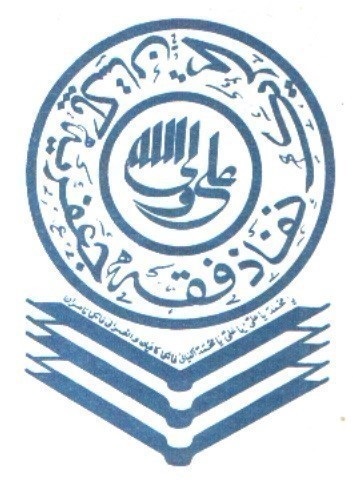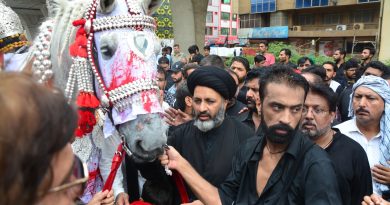Global Al-Baqee day on TNFJ call; Whole Pakistan reverberates with the slogans of the construction of Sacred Cemeteries
April 17, 2024: Global Day of the Demolition of Jannatul Baqee: Tehreek e Nafaz e Fiqh e Jafariya call for the eradication of extremism and the restoration of sacred sites has echoed through the streets, highways and press clubs of every city. Shia-Sunni unity against the desecration of the shrines of the Ahlul Bayt, Mothers of the faithful, and the pious companions of the Holy Prophet.

The restoration of the honour and dignity of the shrines of Jannatul Baqee is the key to solving the issues of Palestine and Kashmir. Under the Moosavi-Junaijo Accord of 1985, the government of Pakistan is bound to make diplomatic efforts for the restoration of the sanctity of the sacred shrines at the embassy level.

The resolutions approved in the rallies include the affirmation of the rights of the oppressed, solidarity with the Pakistan Armed Forces, the implementation of all aspects of the National Action Plan, and the demand for the eradication of injustices against the Shia community.

The participation of millions of children of Islam in the Jannatul Baqee rallies, the emotional scenes of love for the Prophet and his Household, and the global movement to restore the shrines have earned Agha Hamid Moosavi a tremendous vote of confidence.
Marches were held in Rawalpindi, Murree Road, Abpara, Islamabad, Empress Road, Lahore, Peshawar, Karachi, Quetta, Multan, Faisalabad, Khanewal, Sukkur, and all other cities, marking the beginning of a global movement for the restoration of the shrines.

The movement against the desecration of the sacred shrines of Muslims in the land of Hijaz was celebrated with determination to end religious extremism and restore the sanctity of Muslim holy sites, including Jannat-ul-Baqee. On this occasion, participants paid tribute to Quaid e Milat e Jafariya who turned the demand for the reconstruction of the holy shrines of Jannat-ul-Baqee and Jannat-ul-Muallah into an international movement.

Likewise, throughout the world, all major and minor cities, towns, and villages of Pakistan witnessed mourning processions organized by the Tehreek e Nafaz e Fiqh e Jafariya and its sub-department. During these demonstrations, millions of faithful followers participated, holding protests at press clubs and public places, demonstrating practical allegiance to the Holy Prophet Muhammad, his household, and his esteemed companions. They demanded the reconstruction of the shrines of the beloved daughter of the Prophet and the Ladies of Paradise; Hazrat Fatima Zahra, wives of the Holy Prophet Hazrat Khadijah, Hazrat Aisha, Hazrat Hafsa, and his esteemed companions such as Hazrat Uthman. They also demanded the restoration of the graves and shrines of the Imams of the Ahl-ul-Bayt, especially the sacred shrines of Imam Hassan, Imam Zain-ul-Abideen, Imam Baqeer, and Imam Jafar Sadiq.

In a special message issued by the Headquarter Maktab e Tashayyao, Allama Agha Syed Hussain Muqadasi, the Chief of the Tehreek-e-Nifaz-e-Fiqh-e-Jafariya (TNFJ), stated that desecrating the symbols of Allah’s reverence in the land of Medina and Mecca and bulldozing the pure graves and shrines of the benefactors of Islam and humanity is a matter of faith and honour for the Muslim world. He emphasized that the tragedy of the destruction of Jannat-ul-Baqee has been continuing for over a century, but the sanctified shrines of the faithful will remain alive in the hearts of believers. Agha Muqadasi stated that the oppression at Jannat-ul-Baqee is like the grief of Karbala’s martyrs, revealing tyranny, extremism, and terrorism.

He further stated that the restoration of the dignity and greatness of the shrines of Jannat-ul-Baqee is the key to resolving the issues of Palestine and Kashmir. He emphasized that as long as the holy places are not liberated from the grip of tyranny and oppression, the Islamic world will continue to suffer. He described the colonization of Muslim countries by Zionists and global imperialists as a dire consequence of unjust colonial campaigns, while Muslim nations are chained by the propaganda of international demons.

In Rawalpindi, the Baqee Million March rally was organized, starting from Murree Road and concluding at Col. Maqbool Hussain Imam Bargah. During the procession, Allama Qamar Zaidi, the Secretary of Information of TNFJ, and other leaders addressed the gathering. Another rally was organized from Darbar Sakhi Shah Mehmood Badshah, Islamabad, which was attended by thousands of people. The rally proceeded through the designated routes and reached Aabpara Chowk, where the Central Secretary General TNFJ, Allama Basharat Hussain Imami, addressed the participants. The rally included hundreds of young workers from different generations and youth groups, holding banners depicting Jannat-ul-Baqee, with slogans calling for its reconstruction.

Another mourning protest rally was organized in front of the Karachi Press Club, led by the provincial president of TNFJ, Mohammad Ali Shah Zaidi Aal-e-Qasim, Allama Ali Irfan Haider Abidi, Badar Termizi, Ammar Yaser Alvi, Allama Saqlain Jamil, Syed Sabtain Hasan Naqvi, and other leaders. Famous reciters also delivered emotional elegies during this event. In Lahore, a mourning protest rally was organized from Masjid-e-Bibi Pak Daman, which passed through Empress Road and reached Shimla Hill Press Club, where TNFJ’s provincial spokesperson Syed Hasan Kazmi, Allama Syed Shabih ul Hassan Kazmi, and other officials addressed the gathering. Later, the participants offered mourning rituals at Masjid-e-Bibi Pak Daman. In Peshawar, a rally was taken out from the Qissa Khwani Bazaar led by the provincial president Ghazanfar Ali Shah. In Multan, the mourning protest rally of the Press Club was led by provincial president Allama Syed Baqeer Ali Naqvi, Qamar Husain Naqvi, Muhtashim Naqvi, and other Shia-Sunni scholars and leaders.

In Larkana, a grand rally of TNFJ was led by provincial organizer Allama Qazi Ghulam Raza, provincial vice president Manzoor Ali Jalbani, Molana Hafiz Imtiaz Makool, Ghulam Qabir Kalari, Parvez Ali Sangi, Nazir Ali Sangi, and other leaders. In Mirpur Khas, Dr Thaqib Kazmi, Vice President of TNFJ, led the rally, while Murtaza Rajan and Shikarpur Provincial Secretary General Ali Raza Panhwar led the rally in Shikarpur. In Attock, Jhang, Maulana Shafqat Hussain Naseer and Iftikhar Hussain led the procession. In front of the Quetta Press Club, the provincial president Mustafa Kamal Changizi, Sardar Tariq Jafri, and other leaders led the mourning protest. Additionally, protests were held in various cities including Islamabad, Haripur, Sialkot, Bahawalpur, and Faisalabad. Young workers of the Mukhtar Generation protested vigorously against the desecration of Jannatul Baqee at Deena Chowk Jhelum Road. On this occasion, GT Road was blocked. Mourning processions were held in Muzaffarabad, Hyderabad, Gilgit-Baltistan, Bagh, Gujarat, and Dera Ghazi Khan.

Protest rallies were also held in Bhakkar, Vehari, and Kohat in front of the Press Clubs. Lal Masjid also witnessed a widespread protest procession on the occasion of the global day of mourning for Jannatul Baqee, followed by the holding of mourning gatherings. A mourning protest procession was taken out in Khairpur Mirs. Processions were taken out from major cities and towns of Sindh and all small and big cities of Punjab witnessed mourning protests. In the approved resolutions of the protest programs, the participants of the mourning protest for the demolition of Jannatul Baqee demanded from the government that according to the Mousavi Junji Resolutions, the state of Pakistan is bound to make efforts at the diplomatic level for the restoration of the sanctity and reconstruction of the holy shrines.
In the resolutions, gratitude was expressed to all the participants and supporters of the peaceful mourning protests around the world, making it clear to the world that the Day of the Demolition of Jannatul Baqee has brought together the East and the West in its embrace. This protest has now evolved into a global movement. Now, this caravan will herald the revolution and safeguard the honour of the Messenger of Allah, and this revolution will pave the way for the emergence of Imam Mahdi, upon him be peace, and the flag of justice and fairness will be raised all over the world.
The government demanded in the resolutions to acknowledge that the National Action Plan is a simple formula for controlling terrorism in the country, which should be implemented with certainty. Rather than embellishing the clauses of the National Action Plan into files, it was demanded to implement them uniformly in the field.
In the resolutions, condemnation was made of incidents of terrorism occurring in various parts of the country, whether it be the Noshki incident, the killing of labourers, or making passengers travelling by buses targets of terrorism. It was made clear that global imperialism and eternal enemies are involved in terrorism, and the Shia community, along with its brave armed forces, are standing against them.
The controversial legislation of military amendments was rejected in the resolutions, and it was emphasized that there is no need for any such law in the presence of the Constitution of 1973, which may open the doors of unrest and lawlessness in the country.
Criticism was also directed at changes in the education curriculum; it was demanded that the curriculum should remain the same as dictated by the Quran and Hadith, and controversial elements should be removed from it while preserving the teachings of Islam and the personalities of Islam.
It was agreed upon that decisions of national importance should be made with the consensus of all schools of thought so that national unity and harmony can be promoted, and tensions can be alleviated.
The participants of the mourning protest pledged that no attempt to falsely accuse the headquarters of the Shia Movement for the Implementation of the Jafari Jurisprudence of any proscribed group will succeed, and the movement will continue under the leadership of the leader of Shia, Agha Moosavi, to strive for the sacred goals of the nation and the world.
It was affirmed that the country will not deviate from the vision of Quaid-e-Azam Muhammad Ali Jinnah and Allama Muhammad Iqbal, so that, benefiting from the blessings of a separate and free country, it can face every challenge.
In the mourning protest demonstrations of the Day of the Demolition of Jannatul Baqee, prayers were offered for the success of the country and the nation, as well as for all oppressed people including the Palestinians, Kashmiris, and all deprived individuals around the world.




